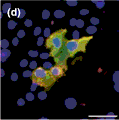Chemistry, Department of: Faculty Series

Ronald Cerny Publications
Document Type
Article
Date of this Version
2008
Citation
AJP February 2008, Vol. 172, No. 2
Abstract
Critical to the proper maintenance of blood-brainbarrier (BBB) integrity are the endothelial tight junctions (TJs). Posttranslational modifications of essential endothelial TJ proteins, occludin and claudin-5, contribute and possibly disrupt BBB integrity. Our previous work has shown that Rho kinase (RhoK) activation mediates occludin and claudin-5 phosphorylation resulting in diminished barrier tightness and enhanced monocyte migration across BBB in the setting of human immunodeficiency virus-1 encephalitis (HIVE). To determine whether RhoK can directly phosphorylate TJ proteins, we examined phosphorylation of cytoplasmic domains of recombinant claudin- 5 and occludin by RhoK. We found that RhoK predominately phosphorylated two sites on occludin (T382 and S507) and one site on claudin-5 (T207). Specific anti-phosphopeptide antibodies were developed for these sites, allowing the detection of phosphorylated occludin at T382 and S507, and claudin-5 at T207 from full-length recombinant occludin and claudin-5 transiently expressed in COS-7 cells and mouse brain microvascular endothelial cells. Finally, these phosphospecific antibodies demonstrated enhanced staining of brain endothelial cells in the mouse model for HIVE and human HIVE brains featuring mononuclear cell infiltration across disrupted BBB. Our results demonstrated the direct phosphorylation of occludin and claudin-5 by RhoK at specific sites, which was increased in encephalitic brain tissue. These antibodies could be useful reagents for monitoring BBB dysfunction in vivo.
Included in
Analytical Chemistry Commons, Medicinal-Pharmaceutical Chemistry Commons, Other Chemistry Commons


Comments
Copyright 2008 Yamamoto et al